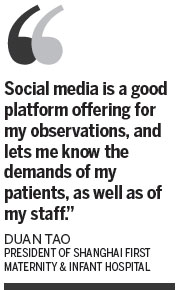Doctors become social media stars
Updated: 2014-12-24 07:52
By Xinhua(China Daily USA)
|
|||||||||
Gong Xiaoming, an obstetrician at a public hospital in Shanghai, usually sees up to 30 outpatients a day, but when he writes an article about uterine fibroids, it can easily draw tens of thousands of clicks within a day on his micro blog.
"I can't believe that an online doctor can be so influential," said Gong, 42.
By day he works at Shanghai First Maternity and Infant Hospital, but 520,000 people follow him round-the-clock on Sina Weibo.
Gong's popularity started with an article he wrote in 2012, saying that many female patients were diagnosed or even prescribed treatments to deal with "cervical erosion", which he believes is not a real medical condition.
Gong hoped the article would raise public awareness about overtreatment. He put it on his micro blog, and it was soon reposted 33,000 times, with over 4,000 comments. A micro-blogger replied, "Hail to the doctor with a conscience!"
A search for "doctor" on Sina Weibo can produce more than 2,700 accounts, nearly half of them accredited to specific hospitals. There are also hundreds of "nutritionists" and "medical technicians". Followers range from thousands to millions. The most popular doctor's micro blog has 3.61 million "fans", 30,000 more than Beijing Ducks basketball star Stephon Marbury.
As well as popularizing medical science, these people are revealing the human face of their profession through social media. They speak the slang of the Internet, talk about their private lives and make fun of themselves.
A former staff member at the prestigious Peking Union Medical College Hospital, Yu Ying, is a pioneer doctor in social media. She gathered a following by sharing the joys and embarrassments of working in a major hospital. However, her posts often sparked controversy by revealing problems in China's healthcare system.
Dong Ning, a young pediatrician, has no time to run his own Weibo account, but he believes that the online consultations can help cut patients' medical costs.
Dong cites the example of a pregnant woman who might have questions during her pregnancy. In the West, she could ask her family doctor for help, but in China, she must register at various departments in a crowded hospital, sometimes choosing the wrong department.
"Doctors' social media accounts fill in the blanks," Dong said.
"Social media is a good platform offering for my observations, and lets me know the demands of my patients, as well as of my staff," said Duan Tao, president of Shanghai First Maternity & Infant Hospital. He began his Weibo and WeChat micro blogs, "Dr Duan Tao", in March, and has more than 70,000 followers.

But they also open themselves to direct criticism. "As a president, I used to be the last one to know patients' complaints, but now I am the first," Duan said.
For the most part, health professionals are treated with respect.
As a young, inexperienced nutritionist at Beijing Friendship Hospital, Gu Zhongyi, 27, used to believe he had no future "as the nutrition department is usually on the hospital fringes".
But since he began posting weight-loss and nutrition tips in 2010, he has become a celebrity, with TV and online programs inviting him to give lectures.
But the development of online services comes with potential pitfalls.
Gao Lei, a senior hematologist at a public hospital in Chongqing, says an online consultation comes with the risk of misdiagnosis. After all, observation, listening, questions and pulse-taking are fundamental diagnostic methods. "They are irreplaceable," Gao said.
(China Daily USA 12/24/2014 page5)

 Christmas mood in the air across China
Christmas mood in the air across China
 Ethnic Tajik life through the lens of a solider (Part II)
Ethnic Tajik life through the lens of a solider (Part II)
 Top 10 international financial centers
Top 10 international financial centers
 Chinese dancer joins Nutcracker
Chinese dancer joins Nutcracker
 Learning, giving back through basketball
Learning, giving back through basketball
 Telling stories of the Chinese who fought for US
Telling stories of the Chinese who fought for US
 Top 10 economic events in 2014
Top 10 economic events in 2014
 Tajik herdsman's life through lens of a solider
Tajik herdsman's life through lens of a solider
Most Viewed
Editor's Picks

|

|

|

|

|

|
Today's Top News
Commerce decision said to hurt US solar makers
Aid to slain NYC officers' families unites city
Nicaragua canal project has nothing to do with Chinese govt: FM
China needs own metrics for corruption fight
Shanghai index slides 3%
Tollways report loss of 66 bln yuan
Learning about 'Americanness' from Chinese-American vets
Awaiting word from China on hack
US Weekly

|

|








